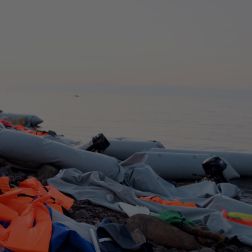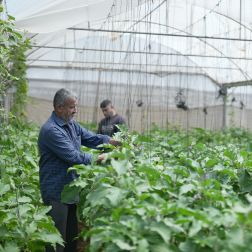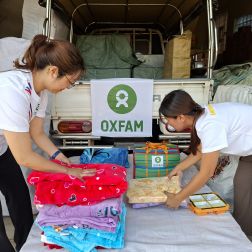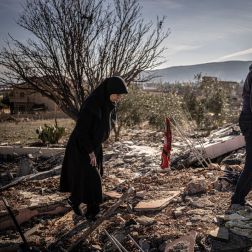- 4 mins read time
- Published: 25th March 2018
Water is Life
To mark the third anniversary of the devastating conflict in Yemen, we conclude our three-part blog by Ibrahim Alwazir, Oxfam’s Social Media Officer in Yemen.
Part 3: Clean water, cholera treatment and hygiene practices

Left: Three of Jameela's children sitting inside the house in the afternoon. Photo: Ameen Al-Ghaberi/Gabreez Right: Mohammed* is a first-grade student. *Name has been changed. Photo: Ameen Al-Ghaberi/Gabreez.
Yemen is the site of the world’s largest cholera outbreak since records began. In less than a year, there have been over a million of suspected cases and more than 2,000 people were killed by the disease.
During the peak of the cholera outbreak, Ahmed’s village was one of the most affected in Habor Zulaimat district in Amran governorate. Almost all of Ahmed’s family were vomiting and were suffering from diarrhoea. He took them to the hospital, and they received Oral Rehydration Solution (ORS) and felt better on the same day. However, Ahmed’s son Ali, who was 13, got infected like the others but by the time they reached the hospital he was already dead.
Ahmed’s wife used to travel six times a day through the rough road to bring water, whenever the donkey was available and awake. But the collected water was unclean.
“The water was unclean, we felt disgusted drinking it. It collects dirt from the mountains around us before it gets here, and animals are also drinking from it and sometimes urinate in it, not to mention that all women from nearby villages wash their clothes in it. It was really disgusting,” said Ahmed.
After two people died in the village, including Ahmed’s son, Médecins Sans Frontières (MSF) opened a Cholera Treatment Centre in the village in order to prevent more deaths. Oxfam targeted the village with awareness campaigns, hygiene kits including ORS and chlorine sachets to clean water, in addition to a water network powered by solar energy, pumping water from a covered well that Oxfam had dug, into a tank connected to a water distribution point.
The villagers are now more comfortable as they no longer have to travel for long distances to fetch water, while enjoying clean and safe water. The village also has now zero cholera cases and the community is more aware of best hygiene practices and how to prevent cholera and other related diseases.
Cash assistance
Jameela Ahmed Hadi Al-Lawtha'I is a widow living in a small room in Khamer district of Amran governorate with seven children (three daughters and two boys). She needs food, water and clothes. Jameela's husband died about seven years ago and cash assistance provided by Oxfam is her sole source of income. Their sole source of water is a well that is located about 30-minutes' walk away from the village. Her sons bring water in the morning and at noon. The soaring prices of food items means that sometimes they sleep hungry.

Ibrahim Alwazir interviewing a community health volunteer in Al-Shanitifah Village, Haour Zulaimat district, Amran governorate. Photo: Wadee Al-Mekhlafi/Oxfam Yemen
One of the world's gravest humanitarian crises
More than 14,600 civilians have been killed or injured during three years of devastating conflict in Yemen and over 2,200 others have died of cholera, mostly children and the elderly. Over three million people have been forced to flee their homes due to the bombing and fighting. The country is on the brink of famine and 75 percent of Yemen’s population need emergency aid.
Oxfam is there
Since July 2015, Oxfam has reached more than 2.8 million people with humanitarian assistance, with the help of our local partners in Yemen. Help includes: clean water and sanitation services, including in hard-to-reach areas of the country, by trucking drinking water, repairing water systems and latrines; Supporting families with cash payments to buy food in the local market or livestock, and cash for work programmes, so they get a possible source of income.
Yet over 22 million people are in dire need of immediate humanitarian assistance. We are delivering emergency aid but we urgently need your help to do more.
Make a donation to support our work




